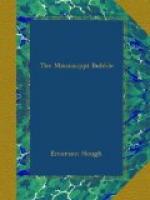To John Law, adventurer, mathematician, philosopher, gambler, it seemed a natural enough thing that he should be asked to sit at the council table with the ablest minds of the day and pass upon questions the most important. This was not what gave him trouble. This matter of the coinage, these questions of finance—they were easy. But how to win the interest of the tall and gracious English girl whom he had met by chance that other morn, who had left no way open for a further meeting; how to gain access to the presence of that fair one—these were the questions which to John Law seemed of greater importance, and of greater difficulty in the answering.
The chair drew up at the somber quarters where the meeting had been set. Law knew the place by instinct, even without seeing the double row of heavy-visaged London constabulary which guarded the entrance. Here and there along the street were carriages and chairs, and multiplied conveyances of persons of consequence. Upon the narrow pavement, and within the little entrance-way that led to the inner room, there bustled about important-looking men, some with hooked noses, most with florid faces and well-fed bodies, but all with a certain dignity and sobriety of expression.
Montague himself, young, smooth-faced, dark-eyed, of active frame, of mobile and pleasing features, sat at the head of a long table. The high-strung quality of his nervous system was evidenced in his restless hands, his attitude frequently changed.
At the left of Montague sat Somers, lord keeper; older, of more steady demeanor, of fuller figure, of bold face and full light eye, a politician, not a ponderer. At the right of Montague, grave, silent, impassive, now and again turning a contemplative eye about him, sat that great man. Sir Isaac Newton, known then to every nobleman, and now to every schoolboy, of the world. A gem-like mind, keen, clear, hard and brilliant, exact in every facet, and forsooth held in the setting of an iron body. Gentle, unmoved, self-assured, Sir Issac Newton was calm as morn itself as he sat in readiness to give England the benefit of his wisdom.
Beyond sat John Locke, abstruse philosopher, a man thinner and darker than his confrere, with large full orb, with the brow of the student and the man of thought. In dignity he shared with the learned gentleman sitting near him.
All those at the board looked with some intentness at the figure of the young man from the North, who came as the guest of Montague. With small formality, the latter rose and advanced to meet Law with an eager grasp of the hand. He made him known to the others present promptly, but with a half apology.
“Gentlemen,” said he, “I have made bold to ask the presence with us of a young man who has much concerned himself with problems such as those which we have now in hand. Sir Isaac Newton, this is Mr. Law of Edinboro’. Mr. Law, the fame of John Locke I need not lay before you, and of my Lord Somers you need no advice. Mr. Law, I shall pray you to be seated.




